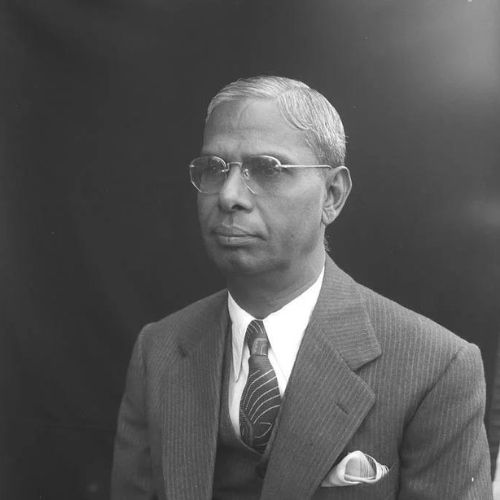Early Life:
R.K. Shanmukham Chetty was born on 17 October 1892 into an affluent family of mill owners in Coimbatore. He spent his early years in Madras, completing his higher studies in Economics and Law from Madras Christian College and Madras Law College.
Role in the Indian Independence Movement:
Chetty held public office at a young age becoming the Councillor of the Coimbatore Municipality in 1917. He began his political career with the Indian National Congress but later shifted to the Justice Party of Madras. He was elected to the Madras Legislative Assembly in 1920. In 1923, he was elected to the Central Legislative Assembly.
In 1931 Chetty introduced a bill in the Central Legislative Assembly that sought to eliminate discrimination against the “untouchable community.
Chetty did not see eye to eye with the Congress Party. He was known to be pro-British and held key political positions under the colonial regime. These included: President, Central Legislative Assembly (1934) and Chairman, Tariff Board.
He was the Diwan of Cochin Princely State between 1935 to 1941. During his tenure, Chetty introduced a number of administrative reforms and worked towards the development of the Cochin Port that was important to the economic prosperity of the State.
Chetty was well-known for his economic and legal acumen. He represented India at several international platforms that included the 1928, 1929 and 1930 International Labour Organisation conferences in Geneva, the 1944 World Monetary Conference at Bretton Woods and the Assembly of League of Nations in 1938.
Contribution to Constitution Making:
Chetty was elected to the Constituent Assembly from the Madras presidency. He did not speak in the Constituent Assembly.
Later Contributions:
Chetty was India’s first Finance Minister and a member of the first Cabinet. He was one of three non-Congress individuals inducted into the Cabinet. On 26 November 1947 he presented independent India’s first budget. He resigned as India’s Finance minister in controversial circumstances: he was alleged to have been part of a scam that protected mill owner from tax evasion investigations.
Chetty significantly contributed to the development of important trade and commerce bodies. He was the head of the Tamil Nadu Industrial Investment Corporation and helped set up the South India Mills Association (1933), South India Textile Research Association and Indian Chamber of Commerce and Industry.
He also contributed immensely to the Tamil language by founding the Tamil College in Perur (1953) and the London Tamil Sangam (1936). He also served as the President of the Tamil Isai Sangam between 1948 and 1953.
In 1951, he was appointed the Vice-Chancellor of Annamalai University, a post which he held for one year.
Chetty succumbed to a heart attack and passed away on 5 May 1953.
- Economic ambassador: the life and work of Dr. Sir R. K. Shanmukham Chetty by Nilkan Perumal (Coimbatore, Popular Hindusthan Publications, 1954).
- R. K. Shanmukham Chetty: The Great Indian Patriots – Volume 2 by P. Rajeswar Rao (Mittal Publications, 1991).
- R. K. Shanmukham Chetty’s Bill to Remove Disabilities Affecting the Untouchable Caste of the Hindu Community, Indian Culture Archives.

